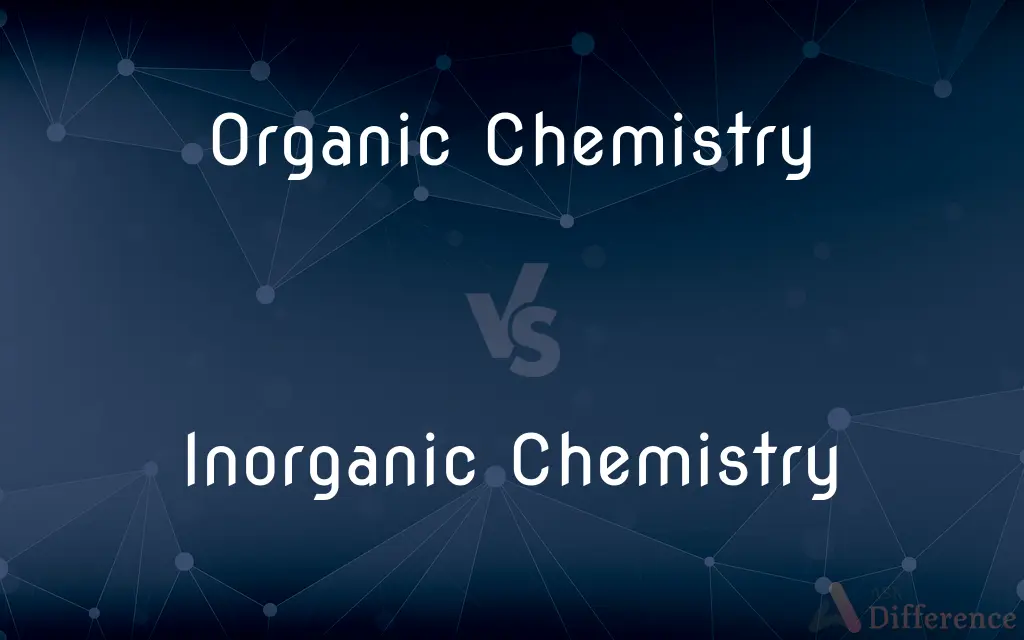Organic Chemistry vs. Inorganic Chemistry — What's the Difference?
Edited by Tayyaba Rehman — By Fiza Rafique — Published on December 22, 2023
Organic Chemistry studies carbon-containing compounds, typically with hydrogen; Inorganic Chemistry focuses on compounds that aren't carbon-based.

Difference Between Organic Chemistry and Inorganic Chemistry
Table of Contents
ADVERTISEMENT
Key Differences
Organic Chemistry is primarily concerned with the study of compounds that contain carbon, generally in combination with hydrogen and sometimes with oxygen, nitrogen, sulfur, phosphorus, and other elements. In contrast, Inorganic Chemistry deals with compounds that do not fall within the realm of organic compounds.
While Organic Chemistry explores the vast array of hydrocarbons and their derivatives, Inorganic Chemistry investigates minerals, metals, and other non-organic compounds. The methods and principles applied in Organic Chemistry often revolve around the formation and breaking of covalent bonds, while Inorganic Chemistry might focus more on ionic or metallic bonds.
Organic Chemistry has led to the discovery and understanding of polymers, pharmaceuticals, and dyes, to name a few. On the other side, Inorganic Chemistry has given insights into materials like ceramics, superconductors, and magnetic substances. The vastness of Organic Chemistry is evident in the multitude of reactions, mechanisms, and compound varieties, whereas Inorganic Chemistry showcases a diversity in coordination chemistry and lattice structures.
In the laboratory, Organic Chemistry often employs techniques like NMR, chromatography, and mass spectrometry, while Inorganic Chemistry might lean on X-ray diffraction, magnetic measurements, and Mössbauer spectroscopy. Although both branches of chemistry have distinct areas of study and methods, they often intersect, especially in the realm of organometallic compounds, bridging the gap between organic and inorganic worlds.
Comparison Chart
Primary Study
Carbon-containing compounds
Compounds excluding organic ones
ADVERTISEMENT
Common Elements
Carbon, hydrogen, oxygen, nitrogen
Metals, minerals, and more
Applications
Pharmaceuticals, dyes, polymers
Ceramics, superconductors, magnetic materials
Bonding Focus
Covalent bonds
Ionic or metallic bonds
Typical Laboratory Techniques
NMR, chromatography, mass spectrometry
X-ray diffraction, magnetic measurements
Compare with Definitions
Organic Chemistry
Explores compounds mainly containing carbon and hydrogen.
Through Organic Chemistry, we understand the behavior of amino acids.
Inorganic Chemistry
Focuses on compounds excluding those based on carbon-hydrogen bonds.
Salts and oxides are explored in Inorganic Chemistry.
Organic Chemistry
Investigates the structure, properties, and reactions of organic materials.
Organic Chemistry plays a crucial role in the petrochemical industry.
Inorganic Chemistry
Study of non-organic substances and their reactions.
In Inorganic Chemistry, we learn about the properties of metals.
Organic Chemistry
Addresses the synthesis and behavior of organic molecules.
Many fragrances are developed using principles from Organic Chemistry.
Inorganic Chemistry
Concerned with ionic, covalent, and metallic bonding in compounds.
Through Inorganic Chemistry, we understand how metals conduct electricity.
Organic Chemistry
Study of carbon-based compounds.
Organic Chemistry delves into the properties of alkanes and alkenes.
Inorganic Chemistry
Branch dealing with minerals, metals, and non-carbon compounds.
Inorganic Chemistry offers insights into the world of precious gemstones.
Organic Chemistry
Branch focusing on hydrocarbons and their derivatives.
Organic Chemistry research led to the development of many modern drugs.
Inorganic Chemistry
Investigates the structure, behavior, and application of inorganic materials.
Advances in Inorganic Chemistry have improved battery technology.
Common Curiosities
Is diamond studied in Organic Chemistry due to its carbon base?
No, while diamond is carbon-based, its study typically falls under Inorganic Chemistry due to its bonding and structure.
What is Inorganic Chemistry?
It examines compounds that aren't based on carbon-hydrogen bonds, including minerals, metals, and more.
Why is carbon central to Organic Chemistry?
Carbon's ability to form stable covalent bonds with other carbons allows for a vast array of complex molecules.
Do Organic and Inorganic Chemistry ever overlap?
Yes, especially in areas like organometallics and certain areas of bioinorganic chemistry.
How do Organic and Inorganic Chemistry differ in applications?
Organic Chemistry plays a role in pharmaceuticals and dyes, while Inorganic Chemistry is vital for materials like ceramics.
Is water studied in Organic Chemistry?
While water is a compound without carbon, it plays a significant role in Organic Chemistry reactions, but its study primarily falls under Inorganic Chemistry.
Do both branches use the same laboratory techniques?
While there's overlap, each branch has specialized techniques; for instance, Organic might use NMR while Inorganic might use X-ray diffraction.
What is Organic Chemistry?
A branch of chemistry that studies carbon-containing compounds, often combined with hydrogen and other elements.
Which branch studies organometallic compounds?
Both. Organometallic compounds, containing metal-carbon bonds, bridge the gap between Organic and Inorganic Chemistry.
Why is Inorganic Chemistry important for industries?
It provides insights into materials, catalysts, and processes vital for many industries, from electronics to mining.
Is Organic Chemistry limited only to living organisms?
No, while many organic compounds are linked to life, many are synthesized in labs and aren't associated with living things.
What's a unique aspect of Inorganic Chemistry?
Its study of coordination compounds and the diverse structures they can form.
Are both Organic and Inorganic Chemistry taught in college?
Yes, both are fundamental areas of study in chemistry courses at colleges and universities.
How has Organic Chemistry impacted daily life?
From medicines to plastics, its principles are foundational to many products and technologies.
Which branch would study a newly discovered metal?
Inorganic Chemistry.
Share Your Discovery

Previous Comparison
Windows 8 vs. Windows 8.1
Next Comparison
Undefined Slope vs. Zero SlopeAuthor Spotlight
Written by
Fiza RafiqueFiza Rafique is a skilled content writer at AskDifference.com, where she meticulously refines and enhances written pieces. Drawing from her vast editorial expertise, Fiza ensures clarity, accuracy, and precision in every article. Passionate about language, she continually seeks to elevate the quality of content for readers worldwide.
Edited by
Tayyaba RehmanTayyaba Rehman is a distinguished writer, currently serving as a primary contributor to askdifference.com. As a researcher in semantics and etymology, Tayyaba's passion for the complexity of languages and their distinctions has found a perfect home on the platform. Tayyaba delves into the intricacies of language, distinguishing between commonly confused words and phrases, thereby providing clarity for readers worldwide.
















































